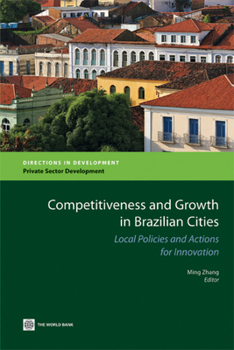Competitiveness and Growth in Brazilian Cities: Local Policies and Actions for Innovation
'Competitiveness and Growth in Brazilian Cities' addresses the question of what cities can do to improve economic performance and create jobs. The topic is explored through a review of theories and policy options for city competitiveness, preliminary benchmarking of Brazilian cities, and case studies of two urban areas in Northeast Brazil--the Cariri region, Cear and S o Lu s, Maranh o. The book concludes that to be competitive, cities need to reduce the cost of doing business by improving their services and infrastructure and by reducing bureaucracies. But for a middle-income country such as Brazil, which needs to be economically competitive in a globalized environment, this is not sufficient. Cities also need to add value to local businesses. A crucial part of their strategy should be to create and sustain an environment that stimulates local firms to innovate and learn from each other, to nurture the creation of synergies generated by the interconnected economic clusters in the city, and to provide incentives for all local players to continuously upgrade their level of competitiveness. With regard to local policy actions, this book highlights the cluster approach to competitiveness, with its focus on facilitating private-sector collaborations for collective efficiency. 'Competitiveness and Growth in Brazilian Cities' provides many examples of actions that may be undertaken at the local level, emphasizing the critical importance for cities to pursue a unique strategy based on their comparative and competitive advantages.
Format:Paperback
Language:English
ISBN:0821381571
ISBN13:9780821381571
Release Date:November 2009
Publisher:World Bank Publications
Length:218 Pages
Weight:0.66 lbs.
Dimensions:0.5" x 6.0" x 9.0"
Customer Reviews
0 rating





